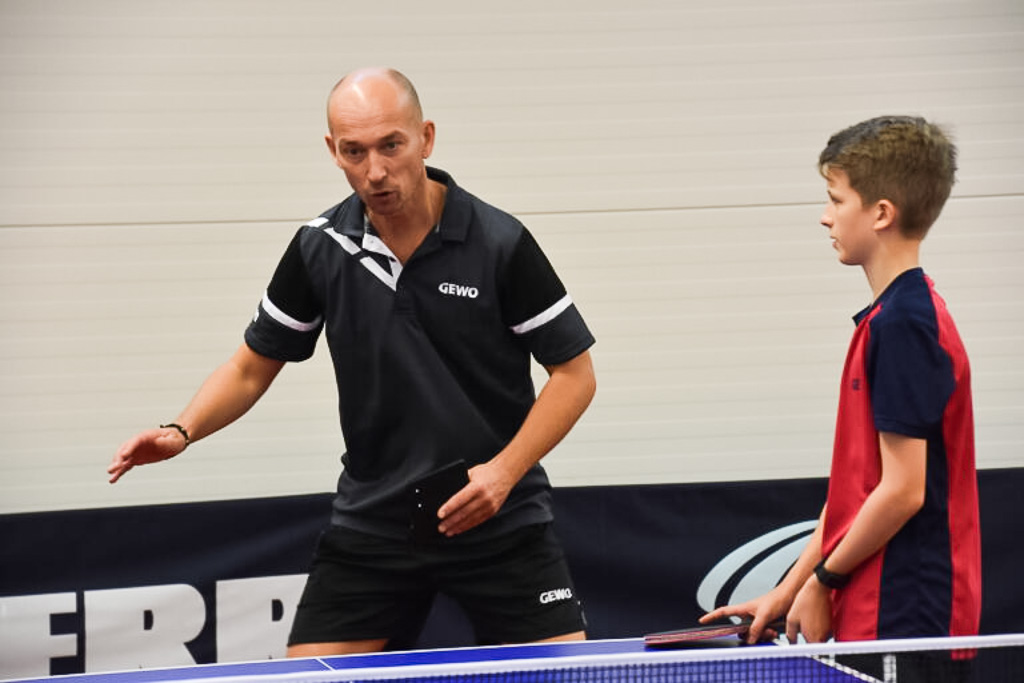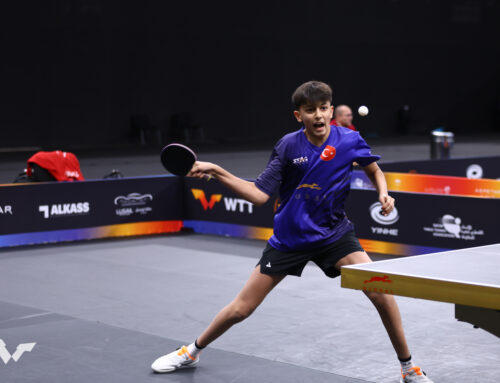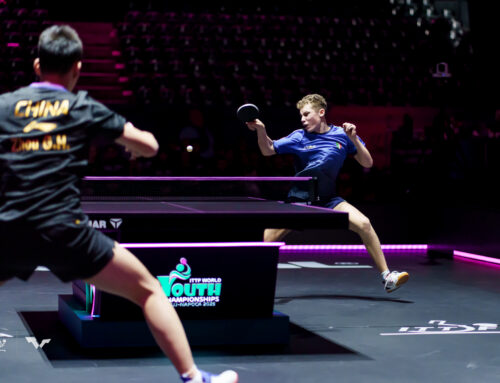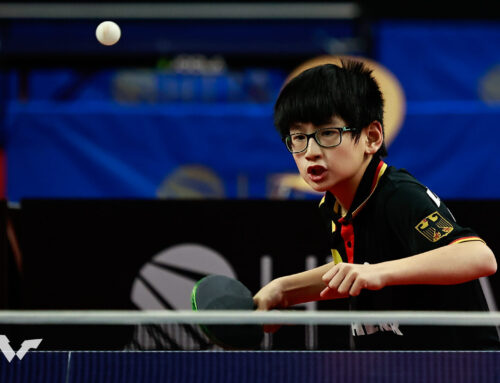Gauzy Style: Continuous training and a new backhand
Simon Gauzy, a French table tennis player supported by compass, shares his excitement at finally participating in a competition after the pandemic. He felt confident and determined to reach the top while balancing his professional career and family.
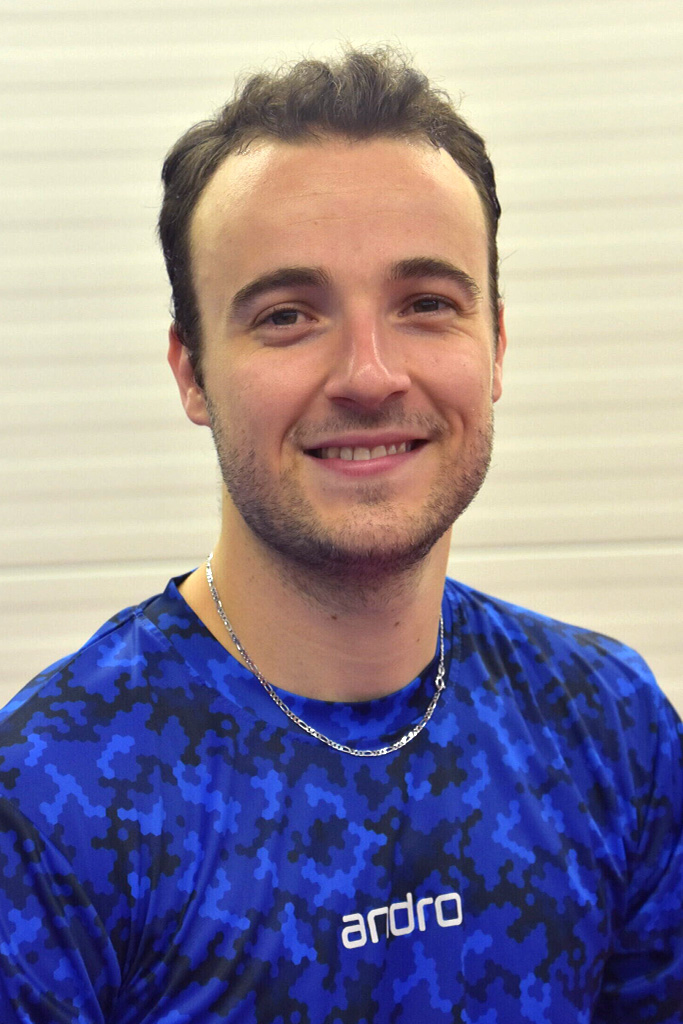
none
Simon Gauzy. Foto: Jens Fellke
It’s February 2021 and in three days’ time Simon Gauzy will board a plane to Qatar where he will participate in the WTT Middle East Hub in Doha and play two tournaments; the WTT Contender and WTT Star Contender. He just got the feedback that his last COVID test, like the many other tests he took throughout the last year, was negative. Despite this good news, tomorrow he must test again, since he cannot travel without a negative test, which cannot be older than 72 hours.
“I’m so fired up for the tournament,” says Simon on the phone, at home in Ochsenhausen. “I can’t wait to play in an international competition again. Sure, there will be another COVID test in Qatar and additionally a 48-hour quarantine before we are allowed to train, but I have no problem with being alone for a while and eating alone. I read a lot and even bought extra books to fill the time. Normally I read thrillers or sports biographies, but since my partner and I are in the process of building our own house, I am reading a lot about that right now. I’m also trying to educate myself a bit on the subject of financial investing.”
His voice sounds a little exhilarated but that only speaks to the 26-year-old Frenchman’s current life situation; a table tennis athlete, recent father, all while building his own home from scratch and learning how to invest savings for a profitable future, topped off with the cherry of facing his first competition since the start of the pandemic.
“When everything was interrupted almost a year ago, I played one of my best tournaments ever,” Simon continues: “That was also in Qatar. I beat Groth and Calderano 4-1 and made it to the quarterfinals, where I lost to Xu Xin 3-4.”
The pandemic could not have come at a more inconvenient time for him, especially as this top tournament performance was in his phase of climbing the world rankings, accumulating points at a steady pace. He was gaining recognition and enjoying athletic success when the world shut down, so it is understandable that for him “after Qatar, it was really a crazy year. I find especially the thought that this state could become a normal state quite scary…”
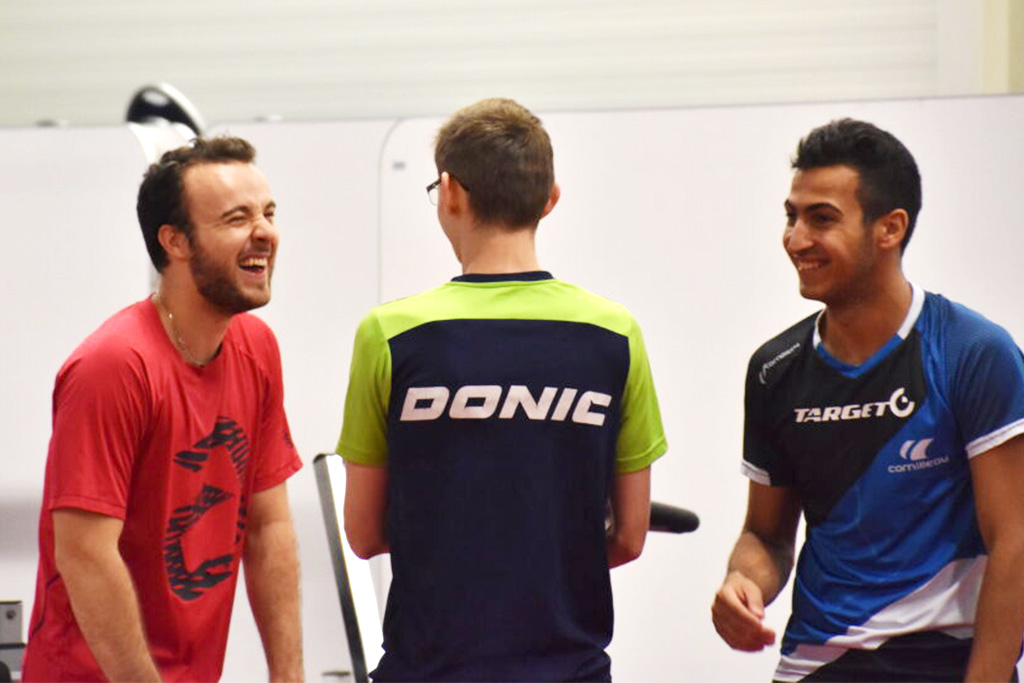
none
Fun in the training hall. Photo: Jens Fellke
Continuity
Despite these difficulties, Simon feels that the first two months of lockdown and the associated restrictions were not too bad. While the pandemic was of course a worldwide and national catastrophe, the restrictions imposed also resulted in few unexpected positives for Simon personally.
“It was a long time where there was no travelling. My training was not interrupted by tournaments or games and I could train normally in Ochsenhausen because the hall is private property. In the beginning, I trained twice a day. But when the decision was made that the Olympics would be postponed, I unfortunately lost some motivation and opted to train once a day instead, but for a longer period of time.”
Not only was Simon able to train without interruptions since a long while, but was also afforded more time with his partner and 2-year-old son.
“It was great to be able to be with my family every day, to spend everyday life with them and also to share household responsibilities. I was there when my son took his first steps, which I’m pretty sure I would have missed if it weren’t for the pandemic. Me and my partner also realised that it was probably the first time in ten years that we had slept in the same bed for 30 days straight.”
While these first two months were indeed somehow a blessing, bringing the joys of family life and athletic development, reality came knocking on the door with the harsh realisation that the pandemic would not only limit personal life, but life in the public sphere, for quite some time.
“I wanted to be able to travel again, play international competitions and see my parents, siblings and friends – to be free again without any fear.”
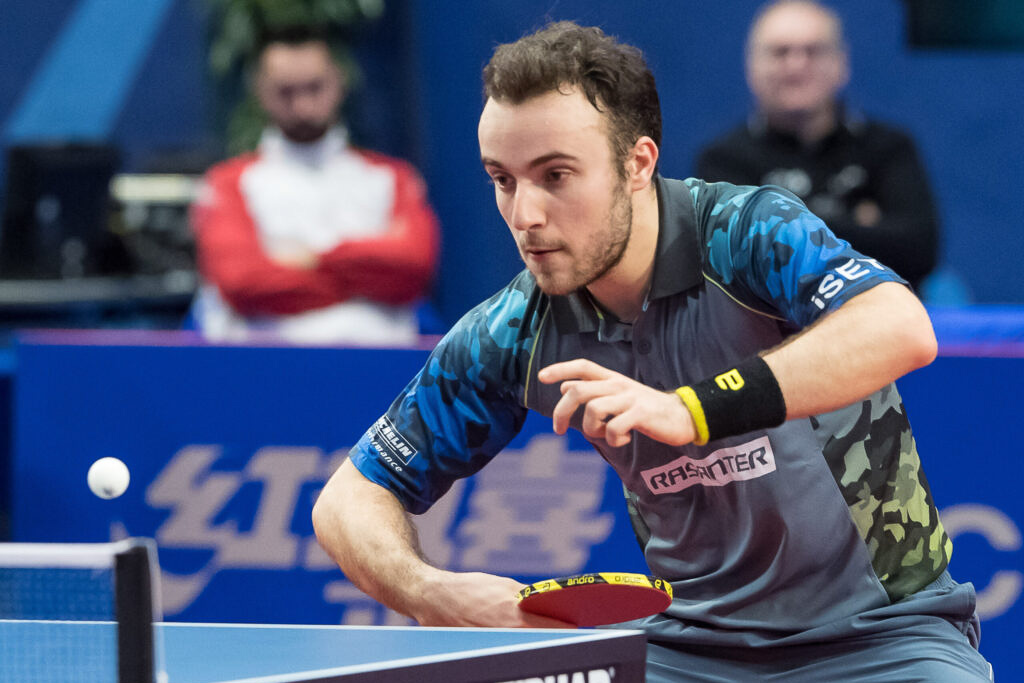
none
Backhand - Gauzy’s new weapon. Photo: ITTF
A new backhand
During his more or less uninterrupted training period, Simon had only one thing on his mind: he wanted to improve his backhand.
“It’s obvious that the backhand is becoming more and more crucial. The plastic ball allows less rotation, which makes it easier for the opponent to score directly with hard shots on balls to the forehand. The importance of the backhand is highlighted by the fact that all European players who have reached a high position in the world rankings in recent years have an excellent backhand, all in their own ways. Falck’s strength is his agile change of pace, Pitchford has his parallel backhand, Calderano has his tough stroke.
I may have realised it a little late, but earlier I didn’t have the confidence to make my backhand a weapon. I have all my other strengths that give me an advantage in the game, my serve and return, my forehand, my wrist, my feel for the ball and a few unusual shots I have curated to confuse my opponents. However, I had only just started to understand that without a solid backhand, I could never make it to the top.”
So, as the pandemic continued on around him, Simon thought everyday about his backhand. It was on his mind before, during and after training. He discussed it extensively with his coaches but mostly he worked, and then he worked some more: gauging the distance to the ball, perfecting technique, practising the minute movements required for a perfect ball strike and learning to maintain stability in his stroke, even when playing with more power. Unsurprisingly, his dedication meant that he made great progress.
“I was always pretty good at just hitting the ball on the table with my backhand. But what I needed was the confidence to put direct pressure on my opponent with the backhand as well. So far, they weren’t afraid to play the ball to my backhand, so of course I would always get a lot of balls there. But now, I even think that I’ve improved a lot here. I’m honestly a little surprised by how much I believe in myself now that I’m quite capable of having a strong backhand game.”

none
Last year, Simon was able to spend a lot of time with his son. Photo: Private
What truly matters
While his interview was being conducted, suddenly Simon’s voice was not the only one on the line, and a sweet squeak could be heard over the phone. Simon’s son was making it very clear that he required the attention of his father and since it was bedtime that means it’s time to snuggle and tell bedtime stories. In other words, time for the interview to end. Clearly, his son has a keen sense of journalistic timing, as this reminder paired perfectly with the last question which asked Simon what impact his becoming a father at 24 years of age had on him not just as a person, but also as a professional athlete.
“It was fantastic, of course, but at the beginning I naturally felt some pressure. When he was born, I was just in the most difficult phase of my table tennis career. I had a few problems with injuries and had fallen in the world rankings. I lost my confidence and started to worry about my income due to the bad results…
Since table tennis is my profession, I was afraid that this negative spiral would go on and on. I was afraid that I wouldn’t be able to give him the life I would like to. I was afraid I wouldn’t be a good father.
I talked about it a lot with my partner and through those conversations I regained confidence in my new role as a father. I was pretty young, and that situation helped me grow up faster, become more mature.
“When I made it back to the top as a player and, from my point of view, was additionally a good father, I was even more proud of myself. A life of both table tennis and family gives me a lot. It doesn’t matter if I just came home from the World Championships, where I beat Xu Xin, and feel at the top of the world or come home having just lost to some low ranked players and feel bad. My son doesn’t know anything about it, nor does he care, always simply greets me with a smile full of love and reminds me of what truly matters. Although I of course still have a strong drive to become a better player, my son puts everything into perspective, and helps me have a different outlook!”
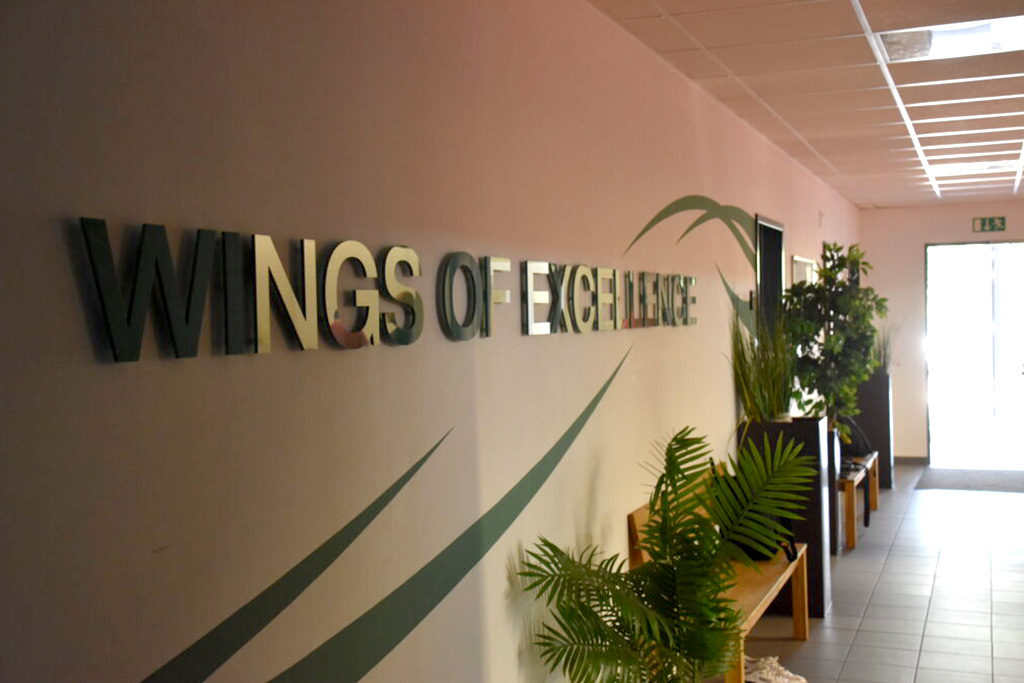
none
Simon Gauzy came to Ochsenhausen at the age of 18. For him, the motto on the wall of the hall seems to have already come true, but he still strives to fly further up. Photo: Jens Fellke
I’m a hungry guy who wants to win titles. I want to maximise my potential. Let’s see how that translates into results. Anyway, when I stop one day, I’ll know that I did everything I could to become as good as I became.
Benedikt Duda
Gauzy Style: Continuous training and a new backhand
Gauzy Style: Continuous training and a new backhand
Simon Gauzy, a French table tennis player supported by compass, shares his excitement at finally participating in a competition after the pandemic. He felt confident and determined to reach the top while balancing his professional career and family.

none
Simon Gauzy. Foto: Jens Fellke
It’s February 2021 and in three days’ time Simon Gauzy will board a plane to Qatar where he will participate in the WTT Middle East Hub in Doha and play two tournaments; the WTT Contender and WTT Star Contender. He just got the feedback that his last COVID test, like the many other tests he took throughout the last year, was negative. Despite this good news, tomorrow he must test again, since he cannot travel without a negative test, which cannot be older than 72 hours.
“I’m so fired up for the tournament,” says Simon on the phone, at home in Ochsenhausen. “I can’t wait to play in an international competition again. Sure, there will be another COVID test in Qatar and additionally a 48-hour quarantine before we are allowed to train, but I have no problem with being alone for a while and eating alone. I read a lot and even bought extra books to fill the time. Normally I read thrillers or sports biographies, but since my partner and I are in the process of building our own house, I am reading a lot about that right now. I’m also trying to educate myself a bit on the subject of financial investing.”
His voice sounds a little exhilarated but that only speaks to the 26-year-old Frenchman’s current life situation; a table tennis athlete, recent father, all while building his own home from scratch and learning how to invest savings for a profitable future, topped off with the cherry of facing his first competition since the start of the pandemic.
“When everything was interrupted almost a year ago, I played one of my best tournaments ever,” Simon continues: “That was also in Qatar. I beat Groth and Calderano 4-1 and made it to the quarterfinals, where I lost to Xu Xin 3-4.”
The pandemic could not have come at a more inconvenient time for him, especially as this top tournament performance was in his phase of climbing the world rankings, accumulating points at a steady pace. He was gaining recognition and enjoying athletic success when the world shut down, so it is understandable that for him “after Qatar, it was really a crazy year. I find especially the thought that this state could become a normal state quite scary…”

none
Fun in the training hall. Photo: Jens Fellke
Continuity
Despite these difficulties, Simon feels that the first two months of lockdown and the associated restrictions were not too bad. While the pandemic was of course a worldwide and national catastrophe, the restrictions imposed also resulted in few unexpected positives for Simon personally.
“It was a long time where there was no travelling. My training was not interrupted by tournaments or games and I could train normally in Ochsenhausen because the hall is private property. In the beginning, I trained twice a day. But when the decision was made that the Olympics would be postponed, I unfortunately lost some motivation and opted to train once a day instead, but for a longer period of time.”
Not only was Simon able to train without interruptions since a long while, but was also afforded more time with his partner and 2-year-old son.
“It was great to be able to be with my family every day, to spend everyday life with them and also to share household responsibilities. I was there when my son took his first steps, which I’m pretty sure I would have missed if it weren’t for the pandemic. Me and my partner also realised that it was probably the first time in ten years that we had slept in the same bed for 30 days straight.”
While these first two months were indeed somehow a blessing, bringing the joys of family life and athletic development, reality came knocking on the door with the harsh realisation that the pandemic would not only limit personal life, but life in the public sphere, for quite some time.
“I wanted to be able to travel again, play international competitions and see my parents, siblings and friends – to be free again without any fear.”

none
Backhand - Gauzy’s new weapon. Photo: ITTF
A new backhand
During his more or less uninterrupted training period, Simon had only one thing on his mind: he wanted to improve his backhand.
“It’s obvious that the backhand is becoming more and more crucial. The plastic ball allows less rotation, which makes it easier for the opponent to score directly with hard shots on balls to the forehand. The importance of the backhand is highlighted by the fact that all European players who have reached a high position in the world rankings in recent years have an excellent backhand, all in their own ways. Falck’s strength is his agile change of pace, Pitchford has his parallel backhand, Calderano has his tough stroke.
I may have realised it a little late, but earlier I didn’t have the confidence to make my backhand a weapon. I have all my other strengths that give me an advantage in the game, my serve and return, my forehand, my wrist, my feel for the ball and a few unusual shots I have curated to confuse my opponents. However, I had only just started to understand that without a solid backhand, I could never make it to the top.”
So, as the pandemic continued on around him, Simon thought everyday about his backhand. It was on his mind before, during and after training. He discussed it extensively with his coaches but mostly he worked, and then he worked some more: gauging the distance to the ball, perfecting technique, practising the minute movements required for a perfect ball strike and learning to maintain stability in his stroke, even when playing with more power. Unsurprisingly, his dedication meant that he made great progress.
“I was always pretty good at just hitting the ball on the table with my backhand. But what I needed was the confidence to put direct pressure on my opponent with the backhand as well. So far, they weren’t afraid to play the ball to my backhand, so of course I would always get a lot of balls there. But now, I even think that I’ve improved a lot here. I’m honestly a little surprised by how much I believe in myself now that I’m quite capable of having a strong backhand game.”

none
Last year, Simon was able to spend a lot of time with his son. Photo: Private
What truly matters
While his interview was being conducted, suddenly Simon’s voice was not the only one on the line, and a sweet squeak could be heard over the phone. Simon’s son was making it very clear that he required the attention of his father and since it was bedtime that means it’s time to snuggle and tell bedtime stories. In other words, time for the interview to end. Clearly, his son has a keen sense of journalistic timing, as this reminder paired perfectly with the last question which asked Simon what impact his becoming a father at 24 years of age had on him not just as a person, but also as a professional athlete.
“It was fantastic, of course, but at the beginning I naturally felt some pressure. When he was born, I was just in the most difficult phase of my table tennis career. I had a few problems with injuries and had fallen in the world rankings. I lost my confidence and started to worry about my income due to the bad results…
Since table tennis is my profession, I was afraid that this negative spiral would go on and on. I was afraid that I wouldn’t be able to give him the life I would like to. I was afraid I wouldn’t be a good father.
I talked about it a lot with my partner and through those conversations I regained confidence in my new role as a father. I was pretty young, and that situation helped me grow up faster, become more mature.
“When I made it back to the top as a player and, from my point of view, was additionally a good father, I was even more proud of myself. A life of both table tennis and family gives me a lot. It doesn’t matter if I just came home from the World Championships, where I beat Xu Xin, and feel at the top of the world or come home having just lost to some low ranked players and feel bad. My son doesn’t know anything about it, nor does he care, always simply greets me with a smile full of love and reminds me of what truly matters. Although I of course still have a strong drive to become a better player, my son puts everything into perspective, and helps me have a different outlook!”

none
Simon Gauzy came to Ochsenhausen at the age of 18. For him, the motto on the wall of the hall seems to have already come true, but he still strives to fly further up. Photo: Jens Fellke

